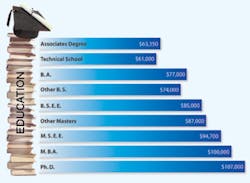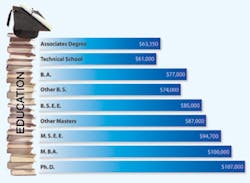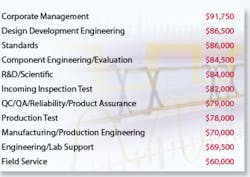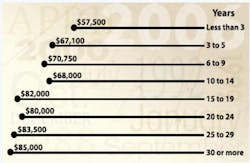Is the electronics industry on the road to an economic recovery? Our annual salary survey seems to indicate it�s true.
There was a time when a 5% salary increase was considered standard, even ordinary. With the advent of the 21st century, everything changed. For the last several years, the electronics industry has seen little or no salary increases. But what a difference a year makes.
Last year�s EE-Evaluation Engineering salary survey showed an encouraging but modest rise in salary with a 2.7% increase. However, this year�s results can be called remarkable in today�s working environment. After years of median salaries hovering in the $70,000 range, this year�s survey takers reported a $5,000 increase from last year�s $75,000 to a median salary of $80,000, a 6.6% increase.
Almost 650 EE readers participated in this year�s salary survey and not only reported optimistic results in salary increases but also insight on job security and satisfaction, career issues, web seminars, and median pay compared with job function, education, years in industry, and geographical region.
�The electronics industry is making a comeback,� said Dat Nguyen of Texas Instruments. �In my workplace, business and salaries have picked up. We are hiring a lot, and this has pushed salaries up,� he said.
Mr. Nguyen, a failure analysis engineer located in Dallas, is glad to see salaries on the rise because, for him, good pay relates to happiness in the workplace. �Salary is one of the most important factors in job satisfaction,� he said. �I need to be perceived as well paid or adequately compensated compared to my peers in the same profession.�
Money Isn�t Everything
The 2006 salary survey showed that 85% of the respondents were either satisfied or very satisfied with their current job and 76% with their overall career. Most participants have been at their existing job for six to 14 years. This year, 19% of those who took the survey said they were more satisfied, and most felt the same level of satisfaction (57%). A percentage (24%) was less satisfied.
Jay Gamerman of Acrodyne Industries in Maryland agreed salary is an important component to overall job satisfaction but not the only thing. �Having a good salary and benefits makes the financial part of the equation lighter,� he said. �But what is significant is working for someone who trusts your judgment to get the job done and gives you the freedom to do your job without micromanaging.�
Less stress and more time off are on the wish list for Jim Hull of Micron Technology located in Boise, ID. �Sure, if I were making less, I would not be as satisfied with my job, but that is only part of it,� he said. �Even more, I value my time off and having fun and challenging projects to work on.�
This year�s survey asked respondents to rank the following eight career issues in order of importance: education, job market/security, outsourcing, pension, professional ethics, salary, technical obsolescence, and work/life balance. Salary and work/life balance tied for first place with 65% of the vote, and job market/security came in second place with 50%.
�I value my time off work very much,� said Mr. Hull, a product engineer who creates test software for verifying component specs and debugging new chip designs. �It gives me time to relax and take my mind off the office. Engineering is my profession but not my life. I have varied interests and hobbies. I need the time to do those to keep my mind clear and focused when I go to work.�
Mr. Gamerman, a principal engineer for a medium size company that designs and builds high-power television transmitters, holds the same sentiment about work/life balance. �I work to live not live to work,� he said. �I quit a previous employer that took the attitude that engineers are a resource to be used as needed and laid off when not needed or burned out.�
Web Seminars Offer Better Work/Life Balance
The need for quality time may directly correlate with the popularity of web seminars. A total of 52% of the respondents said they attended one last year, and 43% noted their level of participation in web seminars would increase in 2006.
�I believe education is very important in developing a career,� said Kurt Veggeberg of National Instruments in Austin, TX. �Web-based training programs open the possibility of doing more training in a cost-effective manner. More training and less travel and nonproductive time make for a better work/life balance.�
Mr. Nguyen of Texas Instruments concurred. �Web seminars are an excellent tool because of flexibility,� he said. �The amount of knowledge and issues we have to deal with has been mounting along with job responsibilities. The only way to meet this challenge is to have more web-based interaction.�
Web seminars are important to keep up with the latest information in the market place, said an applications manager from California who preferred to remain anonymous. �Seminars allow people to see what is happening on their own time, to give a good day�s work, and then review the web seminar at their convenience.�
The level of education always plays a part in salary figures (Figure 1). Survey respondents who earned a Ph.D. had the highest median salary of $107,000 with those who obtained an M.B.A. or M.S.E.E. coming in second and third with $100,000 and $94,700, respectively.
Participants who have other master�s degrees saw a median salary of $87,000, and the majority of respondents, who held a B.S.E.E., earned a median salary of $85,000. Those with a B.A. degree took home a median salary of $77,000, and readers who obtained a B.S. degree in something other than electrical engineering had a median salary of $74,000.
Corporate management took home the most pay last year with a median salary of $91,750, and design development engineers were right behind with $86,500 (Figure 2). Workers in the field of standards had a median salary of $86,000 last year, and component/evaluation engineers received $84,500. Those in research and design and incoming inspection test ranked fifth and sixth place for median salaries with $84,000 and $82,000, respectively.
According to the survey, men made more money than women in the electronics industry. Overall, the median salary for men was $80,000 and $70,000 for women.
Survey participants living in the Pacific region of the United States had the highest median salary at $95,000 compared to last year�s survey with $87,000 (Figure 3). Median salary then drops by $10,000 to $85,000 for workers residing in the mountain states. This year�s third-place region represented the northeastern states with a median pay of $80,000 compared to $76,000 in the previous survey. Coming in fourth and fifth for median salary were the central region at $73,000 and southeastern states at $72,000.
Seniority has its advantages (Figure 4). Survey respondents who invested 30 or more years in the electronics industry received a median salary of $85,000, and those who have spent 25 to 29 years in the field brought home $83,500. A median pay of $82,000 and $80,000 was earned by survey takers who worked in the electronics industry between 15 to 19 years and 20 to 24 years, respectively.
Engineers of the Future
A total of 78% of those who took the survey have worked 15 years or more in the electronics industry. In fact, most participants or 73% said they would recommend a career in the field of engineering to their children.
Mr. Gamerman�s son currently is studying mechanical engineering. �I do recommend it as a career if you have the need for the creative outlet it provides,� he said. �But be aware that part of the job is paperwork and other nonengineering-related tasks, especially if you work for a smaller company. If you get with the right company, you can do a lot of interesting things.�
�This is a question I am torn over,� said Mr. Hull of Micron Technology. �I really like what I do, but the stress of always worrying about having your job outsourced is very draining. But if a child has an interest in engineering, then he or she should be encouraged.�
A total of 85% of respondents said they felt secure or very secure in their current job. But on the contrary, 65% said they feel less secure than last year.
�I believe a company has to offer career growth opportunities for employees so they can have job security,� said Mr. Veggeberg of National Instruments. �The easiest way to do this is to continue to make every effort to grow and provide the plans to do this. Our company has consistently done this over the years.�
Mr. Hull lamented, �It would be nice to know that if you worked hard you would always have a job. I think it is very shortsighted of the U.S. government and industry to allow and encourage outsourcing and cutting back on domestic training. Sure, in the short run we see great savings. But in the long run, it will just put our way of life and our country in a downward spiral.�
The California applications manager said he does not feel secure in his job but is creating avenues to make his job more secure. He builds stability in his job by finding a niche that makes him hard to replace.
Most survey participants (78%) did not accept or actively look for a new job in 2005, and in 2006, only 30% said they plan to search for other employment. However, 85% of respondents said they do not expect a promotion this year.
An indication of growth in the electronics industry was shown when 42% of the survey takers said they anticipated the number of engineers to increase in 2006 at their workplace. Only 16% predicted a decrease, and 42% felt there would be no change in numbers.
With 75% of the participants indicating they received a raise in the last year and a marked jump in median salary, it does appear that the electronics industry is experiencing positive growth. Mr. Veggeberg of National Instruments, a business development manager for sound and vibration technologies, agreed. �I believe the industry is making a comeback, and this is indicated in the survey figures,� he said. �Salary increases and business look promising.�
April 2006




